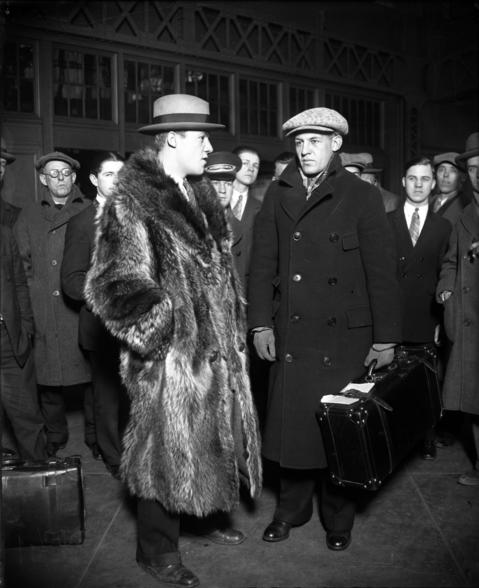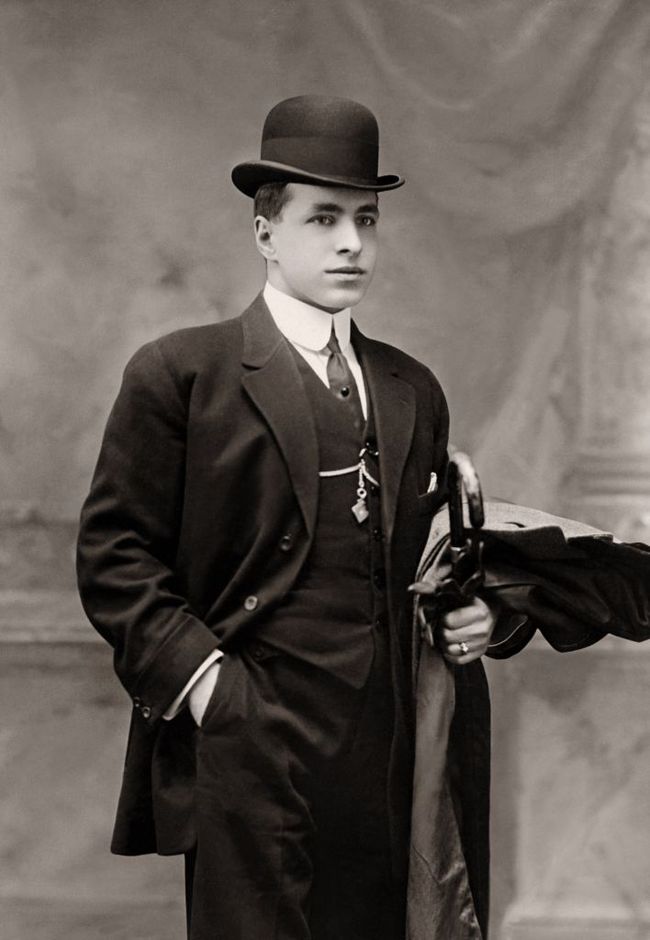1920 -1929
SUITS FOR ALL
In 1922 one fashion critic declared that the lounge suit had become “the almost universal utility dress for men,” but this did not mean that sartorial distinctions had become extinct.
Differences in the quality as well as the quantity of suits a man owned remained.
A suit could be bought ready-to-wear or secondhand, but many men still “bespoke” a suit from their tailor or had it made to measure.
Many appreciated the English cut promoted by London’s Savile Row tailors, but others preferred the less fitted and softer American “sack suit,” or the more overtly fashionable shapes provided by the French taileur.
Suit fabrics became lighter, particularly for summer — as demonstrated by the cloth used to make “Palm Beach” suits in the US.
This affected male underwear and slowly undershirts worn with cotton shorts replaced the earlier “union suit” (all-in-one undergarment).
Toward 1930 the high-waisted suits of the early part of the decade made way for a straighter silhouette.
HATS AND SHOES
Men in the 1920s could choose from a variety of hat shapes that had all been introduced in the previous century.
Other than the top hat, lounge suits could be worn with every hat type.
The bowler, also called derby or coke, was the most formal, followed by the homburg, a stiff felt with a center crease and rolled brim.
The trilby and wider-brimmed fedora, both named after literary characters, were everyday city hats, while the boater or other varieties of straw hat were for summer or the beach.
Shoes had gradually replaced boots since the turn of the century.
These were mainly of the lace-up Oxford type and had to be matched to the rest of the outfit and the season.
Dark business suits were worn with black or tan shoes, but in summer shoes of white leather or cotton duck accessorized white flannels or Palm Beach suits.
Toward the end of the decade two-tone shoes became all the rage.
1920 -1929
大众套装
1922年一位时尚评论家宣称,休闲西装已经成为“男性通用的实用礼服”,但这并不意味着男装的区别已经不存在。
不同人士拥有的服饰数量与质量差异依然存在。
一套西装可以买成衣也可以买二手衣,但许多男士仍从他们的裁缝师哪里“预定”或者量身定做。
许多人都欣赏来自伦敦萨维列缝纫师的英式剪裁,另有一些人则喜欢不怎么贴身并且柔软的美式“套装”,或者由法国缝纫师提供的更为时尚的造型。
西服面料变得更轻薄,特别对于夏季,在美国它们经常被用在“棕榈滩”套装上。
此时收到影响的男装分体打底衫逐渐取代了早期的“一体式内衣”。
到1930年,先前10年的高腰西服让位给了更直挺的轮廓造型。
帽子和鞋子
二十世纪20年代的男人能够选择上一个世纪以来延续下来的帽子造型。
除了高顶礼帽,休闲服可以搭配任意一种帽子类型。
礼帽,也被称为derby或coke,这是最正式的款式,其次是homburg,一种中心褶皱边缘滚边的僵硬帽子。
以文学角色命名,并且宽阔的fedora是日常都市帽子,而船型或者其他款式的草帽则用于夏季和海滩。
世纪之交以来,靴子逐渐被皮鞋取代。
这些系带的牛津皮鞋,必须与衣服的款式和季节相搭配。
深色商务套装必须穿着黑色或棕色的皮鞋,但在夏季白色皮革可以搭配白色短裤或者棕榈套装。












